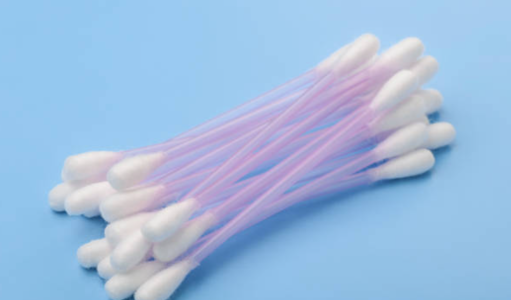This Doctor Says Q-Tips Are Damaging Ears: Find Out the Shocking Reasons Why You Need to Stop Now
By
Gian T
- Replies 8
For many of us, using Q-Tips, or cotton swabs, to clean our ears is a regular part of our hygiene routine. It's a practice that's been passed down through generations, often seen as a necessary step to maintaining cleanliness. However, medical professionals have been warning against this seemingly harmless habit for years, and their advice is becoming increasingly urgent.
A recent plea from a concerned doctor has reignited the conversation about the dangers of using Q-Tips in our ears. 'I've seen horrible things happen,' the doctor stated, urging people to reconsider their ear-cleaning methods. But what exactly are these 'horrible things,' and why should we take heed?
Firstly, it's important to understand the natural mechanism of our ears. The ear canal has a self-cleaning system that moves earwax, or cerumen, from the inner ear to the outer ear, where it can be easily wiped away. Earwax serves as a protective barrier, trapping dust and debris and preventing them from reaching the sensitive eardrum.
When we use Q-Tips, we risk disrupting this natural process. Instead of removing earwax, we often push it deeper into the ear canal, which can lead to impaction. This means the wax becomes lodged in the ear, potentially causing discomfort, hearing loss, tinnitus, and even infections. In severe cases, the pressure from impacted earwax can rupture the eardrum.
Moreover, the delicate skin of the ear canal is easily scratched, and these abrasions can become infected. The ear canal and eardrum are extremely sensitive, and even a minor injury can lead to pain and complications.
So, what should we do instead? The consensus among doctors is simple: leave your ears alone. For most people, the ears will clean themselves, and a gentle wipe of the outer ear with a damp cloth is sufficient. If you're experiencing a sensation of blocked ears or suspect you have an excess buildup of wax, it's best to consult a healthcare professional. They can safely remove the wax using irrigation, suction, or specialised tools.
For our members who wear hearing aids or earplugs regularly, it's especially important to be mindful of ear health. These devices can interfere with the natural migration of earwax, so regular check-ups with an audiologist or doctor are recommended.
In light of this advice, it's time to retire the Q-Tips from our ear-cleaning routines. While it may be a hard habit to break, the potential risks far outweigh the perceived benefits. Remember, good intentions can sometimes lead to bad outcomes, and when it comes to our ears, less is often more.
 We'd love to hear from you, members of the Seniors Discount Club. Have you experienced any ear issues related to Q-Tips? Or perhaps you've already ditched the swabs and have advice to share? Let us know in the comments below, and let's help each other stay informed and healthy.
We'd love to hear from you, members of the Seniors Discount Club. Have you experienced any ear issues related to Q-Tips? Or perhaps you've already ditched the swabs and have advice to share? Let us know in the comments below, and let's help each other stay informed and healthy.
A recent plea from a concerned doctor has reignited the conversation about the dangers of using Q-Tips in our ears. 'I've seen horrible things happen,' the doctor stated, urging people to reconsider their ear-cleaning methods. But what exactly are these 'horrible things,' and why should we take heed?
Firstly, it's important to understand the natural mechanism of our ears. The ear canal has a self-cleaning system that moves earwax, or cerumen, from the inner ear to the outer ear, where it can be easily wiped away. Earwax serves as a protective barrier, trapping dust and debris and preventing them from reaching the sensitive eardrum.
When we use Q-Tips, we risk disrupting this natural process. Instead of removing earwax, we often push it deeper into the ear canal, which can lead to impaction. This means the wax becomes lodged in the ear, potentially causing discomfort, hearing loss, tinnitus, and even infections. In severe cases, the pressure from impacted earwax can rupture the eardrum.
Moreover, the delicate skin of the ear canal is easily scratched, and these abrasions can become infected. The ear canal and eardrum are extremely sensitive, and even a minor injury can lead to pain and complications.
So, what should we do instead? The consensus among doctors is simple: leave your ears alone. For most people, the ears will clean themselves, and a gentle wipe of the outer ear with a damp cloth is sufficient. If you're experiencing a sensation of blocked ears or suspect you have an excess buildup of wax, it's best to consult a healthcare professional. They can safely remove the wax using irrigation, suction, or specialised tools.
For our members who wear hearing aids or earplugs regularly, it's especially important to be mindful of ear health. These devices can interfere with the natural migration of earwax, so regular check-ups with an audiologist or doctor are recommended.
In light of this advice, it's time to retire the Q-Tips from our ear-cleaning routines. While it may be a hard habit to break, the potential risks far outweigh the perceived benefits. Remember, good intentions can sometimes lead to bad outcomes, and when it comes to our ears, less is often more.
Key Takeaways
- Ears naturally clean themselves by moving wax outward.
- Using Q-Tips can push wax deeper, leading to blockages and infections.
- Doctors recommend avoiding Q-Tips and using a damp cloth for the outer ear.
- Hearing aid users should get regular check-ups to manage wax buildup.








